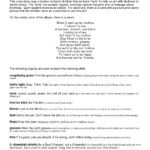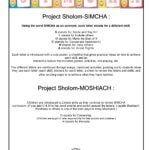The Project Sholom Message is that Kindness is not only something that we 'learn about', but something that is part of our daily lives.
The Project Sholom Method (catchy phrases, visual aids, role play, songs, stories and activities) give children experiences that drive home the lesson that you can be happy by making others happy. The Project Sholom Tools teach kindness skills, one at a time, in a way that is fun, easy to remember, and relevant.
Entry Narrative
A. The Project Sholom Message is that Kindness is not only something that we ‘learn about’, but something that is part of our daily lives. Throughout their years in school, children are constantly reminded to be ‘nice’ and ‘care about each other.’ They are often told stories and taught lessons in the classroom to encourage kindness.
Unfortunately, many of these lessons remain cerebral and theoretical. In many classrooms, these ‘Kindness Skills’ are not broken down into bite-sized, learnable steps, nor are they are taught in a fun, memorable way.
When these children enter the ‘real world’ of playground and community, it’s hard for them to apply these lessons to their daily behavior. For many children, being kind is not second nature. The goal of Project Sholom is to bring these skills to the forefront by teaching and re-enforcing them in a way that children will remember to use them in real life experiences.
B. The Project Sholom Methods (catchy phrases, visual aids, role play, songs, stories and activities) give children experiences that drive home the lesson that you can be happy by making others happy.
The slogan of Project Sholom is “Be Happy-Make Others Happy.”
There is a lot of focus these days on anti-bullying education, which focuses on how to stop negative behavior. Project Sholom takes a positive approach, teaching children what they SHOULD do, which is the natural ‘antidote’ to negative behavior.
Project Sholom takes kindness skills out of the pages of the books and makes it come alive in the classroom.
C. The Project Sholom Tools teach kindness skills, one at a time, in a way that is fun, easy to remember, and relevant.
Children are taught to understand the fundamental skills of ‘real world living’ with other human beings: including others, being flexible, making the best of a situation, avoiding fights, dealing with peer pressure, finding the good in others, to name a few.
Each month, a different skill is introduced and then practiced throughout the month through games and activities.
To date, there are 4 sets of “tools” as outlined below. More details and visual aids can be found in the attachments.
1. Project Sholom Tools for Happiness -Typical everyday objects become “tools” to remind children to be kind to others. Using a message that each object teaches, children are taught the following skills:
Finding the good in themselves and others, being flexible and letting things go, using only nice words, not doing to others what they would not want done to them, staying strong against peer pressure, seeing things in a positive light, the art of having a conversation, being kind to others who are different.
2. Project Sholom-SIMCHA -using the letters of Simcha -(Happiness in Hebrew) as an acronym, children are taught the following lessons: Greeting others in a friendly way, Including others, Making the best of a situation, Cooperation and teamwork, Helping others, Avoiding fights.
3. Project Sholom-MOSHIACH -In addition to reviewing the Simcha curriculum, the children learn the skills of Ownership and Honesty.
4. Project Sholom Word Search -Children are taught and encouraged to be more careful to say please and thank you.
Each curriculum is designed to teach and continuously review and practice a different set of skills. The result is a kinder school environment where children are quicker to include, help, and care about each other.
One area that still needs improvement is getting each individual teacher to encourage the use of these skills. Since teachers are so busy teaching their own curriculum, we found it more useful to have the Project Sholom lessons taught by one instructor. The challenge has been getting teachers to incorporate the skills more in the classroom on a daily basis by using the Project Sholom language. Teachers who were able to do this, found very positive results in creating a culture of kindness in their classrooms.
One more area that is not addressed with Project Sholom is helping children who have extreme social or behavioral challenges. The program encourages positive skills in children, but may not completely change behaviors that need professional help.
This program was created in memory of Sholom Ber Gerber OBM.
Entry Text
A. The Project Sholom Message is that Kindness is not only something that we ‘learn about’, but something that is part of our daily lives. Throughout their years in school, children are constantly reminded to be ‘nice’ and ‘care about each other.’ They are often told stories and taught lessons in the classroom to encourage kindness.
Unfortunately, many of these lessons remain cerebral and theoretical. In many classrooms, these ‘Kindness Skills’ are not broken down into bite-sized, learnable steps, nor are they are taught in a fun, memorable way.
When these children enter the ‘real world’ of playground and community, it’s hard for them to apply these lessons to their daily behavior. For many children, being kind is not second nature. The goal of Project Sholom is to bring these skills to the forefront by teaching and re-enforcing them in a way that children will remember to use them in real life experiences.
B. The Project Sholom Methods (catchy phrases, visual aids, role play, songs, stories and activities) give children experiences that drive home the lesson that you can be happy by making others happy.
The slogan of Project Sholom is “Be Happy-Make Others Happy.”
There is a lot of focus these days on anti-bullying education, which focuses on how to stop negative behavior. Project Sholom takes a positive approach, teaching children what they SHOULD do, which is the natural ‘antidote’ to negative behavior.
Project Sholom takes kindness skills out of the pages of the books and makes it come alive in the classroom.
C. The Project Sholom Tools teach kindness skills, one at a time, in a way that is fun, easy to remember, and relevant.
Children are taught to understand the fundamental skills of ‘real world living’ with other human beings: including others, being flexible, making the best of a situation, avoiding fights, dealing with peer pressure, finding the good in others, to name a few.
Each month, a different skill is introduced and then practiced throughout the month through games and activities.
To date, there are 4 sets of “tools” as outlined below. More details and visual aids can be found in the attachments.
1. Project Sholom Tools for Happiness -Typical everyday objects become “tools” to remind children to be kind to others. Using a message that each object teaches, children are taught the following skills:
Finding the good in themselves and others, being flexible and letting things go, using only nice words, not doing to others what they would not want done to them, staying strong against peer pressure, seeing things in a positive light, the art of having a conversation, being kind to others who are different.
2. Project Sholom-SIMCHA -using the letters of Simcha -(Happiness in Hebrew) as an acronym, children are taught the following lessons: Greeting others in a friendly way, Including others, Making the best of a situation, Cooperation and teamwork, Helping others, Avoiding fights.
3. Project Sholom-MOSHIACH -In addition to reviewing the Simcha curriculum, the children learn the skills of Ownership and Honesty.
4. Project Sholom Word Search -Children are taught and encouraged to be more careful to say please and thank you.
Each curriculum is designed to teach and continuously review and practice a different set of skills. The result is a kinder school environment where children are quicker to include, help, and care about each other.
One area that still needs improvement is getting each individual teacher to encourage the use of these skills. Since teachers are so busy teaching their own curriculum, we found it more useful to have the Project Sholom lessons taught by one instructor. The challenge has been getting teachers to incorporate the skills more in the classroom on a daily basis by using the Project Sholom language. Teachers who were able to do this, found very positive results in creating a culture of kindness in their classrooms.
One more area that is not addressed with Project Sholom is helping children who have extreme social or behavioral challenges. The program encourages positive skills in children, but may not completely change behaviors that need professional help.
This program was created in memory of Sholom Ber Gerber OBM.
Entry Videos
This entry has been tagged with the following terms:

